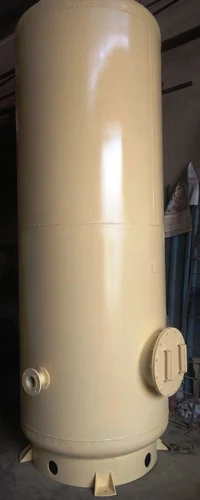Vertical Air Receiver Tank
₹22,500.0
| Minimum Order Quantity | 3 Piece |
| Material | MS |
| Tank Orientation | Vertical |
| Storage Capacity | 5000-10000 L, 0-250 L, 250-500 L, 500-1000 L, 1000-5000 L |
| Pressure Rating | 100-150 psi, 0-100 psi, 150-200 psi, 200-250 psi |
| Color | White, Blue |
We are offering Vertical Air Receiver Tank to our clients.
You must be logged in to post a review.
Q & A
Compressed air receivers, also known as air storage tanks, play a crucial role in compressed air systems by providing a buffer of stored air to meet fluctuating demands. In terms of sustainability, the use of compressed air as an energy storage medium has both advantages and limitations.
Advantages:
Energy Efficiency: Compressed air systems can be energy efficient when properly designed and maintained. By utilizing off-peak or low-cost electricity to compress air during times of low demand, compressed air can act as a form of energy storage. This allows for the efficient use of energy by avoiding the need to run compressors continuously at peak times.
Renewable Energy Integration: Compressed air energy storage (CAES) systems can be integrated with renewable energy sources such as wind and solar. Excess electricity generated by these sources can be used to compress air and store it in receivers for later use, effectively converting intermittent energy into a controllable energy source.
Durability and Longevity: Compressed air receivers are typically made from sturdy materials such as steel, making them durable and long-lasting. With proper maintenance, they can have a long operational life.
Limitations:
Energy Losses: Compressing air generates heat, and this heat energy is often lost during the compression process. Additionally, there are energy losses associated with air leaks and pressure drops in the system, reducing overall efficiency.
Environmental Impact: While compressed air itself is a clean energy source, the process of compressing air typically relies on electricity, which may come from non-renewable sources with associated environmental impacts. The sustainability of compressed air systems depends on the energy source used for compression.
Limited Energy Density: Compared to other energy storage methods such as batteries, compressed air has lower energy density. This means that larger storage volumes are required to store the same amount of energy, which can be a limitation in terms of space and cost.
To improve the sustainability of compressed air systems, it is important to focus on efficient compressor design, minimize air leaks, utilize renewable energy sources for compression, and integrate with energy management systems to optimize overall system performance.
Overall, while compressed air receivers have some sustainability benefits, it is crucial to consider the entire compressed air system and its energy sources to assess the overall environmental impact and efficiency.
General Inquiries
There are no inquiries yet.

















Reviews
There are no reviews yet.